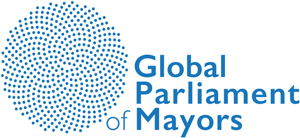Global Parliament of Mayors Annual Summit 2018 – Hannah Muirhead
At the end of last month, the Global Parliament of Mayors (GPM) held its third annual summit in Bristol. 80 mayors from around the world got together to discuss empowering cities as drivers of global change.
It was the clear from the start that the pervading message of the three-day event was that nation states are being weakened, their ability to respond to global challenges reduced, and that cities – and mayors – can and must connect, engage and advance humanity in a way that states are failing to.
The conference was opened by Mayor of Bristol, Marvin Rees, who had a whole series of soundbites around this message, such as: Mayors can shape national policy for global issues; It’s at the city level where we can stitch things together; Mayors are the best people to govern in a world that’s post-national.
He also brought in Vanessa Kisuule, City Poet of Bristol, who wowed the room with three minutes of verse comparing a great and functioning city to a poem – where the mayor is that “One Line” bringing it all together.
Patricia De Lille, Mayor (for now) of Cape Town, stuck with this message, illustrated with evidence from her city’s fight against a drought and water crisis so unprecedented in South Africa that they couldn’t rely on information from their own records or past experiences. She told us that it was by reaching out to other mayors in other cities around the world for lessons and learning that she and her team developed the capacity to bring the city and
surrounding region back from the brink of disaster.
Speaking to mayors and some “mayor expert” delegates, as somebody following the conversations surrounding directly elected mayors in Scotland, was a valuable part of attending the summit. The prevailing opinion of those I spoke to was very much that elected mayors are a powerful tool for cities when it comes to maximising development and growth – because they have the visibility to attract international investment and network internationally, because they have a clear mandate increasing the efficiency of decision making whilst retaining democratic legitimacy, and because the office itself is likely to attract high calibre candidates with experience and connections. None of that was new reasoning, but it was interesting to hear directly from the mouths of those working within elected mayor systems and from those who had experienced the before and after of directly elected mayors in England.
The main part of the conference focused on issues in four areas: migration, health, urban security and climate change. All issues that cross borders and that, again reflecting the conference’s core message, are in need of being addressed in new arenas by flexible, outward-looking, networked actors. i.e. In cities, by mayors.
I was more surprised than I probably should have been given its name, but the Global Parliament of Mayors does very much resemble a parliament. The issues at hand were presented, debated and voted on by the mayors in a series of sessions that took place in the council chamber of Bristol City Hall. The voting was to determine which issues were of most importance to delegates, which issues they would pledge to prioritise at the city level, and which to bring to the attention of policymakers at the national and international level. The results of the voting were used to form the official declaration from the summit which would be used by the GPM in their endeavours to influence policymaking at all three levels. The declaration can be read here.
Things got very meta on the last day as the focus turned from what the GPM as a city network can achieve to the networking of cities itself. In response to the growing world influence of cities, or at least the rapidly urbanising global landscape, there has been a recent proliferation of city networks such as the GPM. It was agreed that such networking can empower cities, but whether or not this translates into real influence is unclear, with
research showing that only around a third of cities networks attempting to influence or participate in global policymaking (the rest focusing on best practice/data sharing).
So, there was a panel session with representatives from cities networks across the world – gathered to discuss with the mayors of this network what the scope is for all these networks to network – to collaborate, to avoid duplication of efforts, to make planning and attending events easier, to empower each other, amplify each other’s work and ensure real influence.
This all seemed quite groundbreaking and I did feel like I was witnessing what was potentially the start the next phase of “cities getting stuff done”.
I think there is perhaps a tendency to over-emphasise the extent to which the nation state is being weakened in order to reinforce the argument that it’s time for other levels of governance to step up. Having said that, all the issues covered at this summit are issues that land firmly in our cities and towns so, regardless of the demise or otherwise of national actors, city leaders are ideally placed to be at the forefront of decision making in these
policy areas. And it seems that maybe it’s mayors who have the mandate, clout and visibility in a global context to make this happen. As evidenced in the GPM sessions and presentations, mayors working together to develop solutions for global issues is already seen to be effective. Certainly, of all the conferences and networks summits I’ve been to recently I came away with a greater impression that this one was doing something solid and
progressive – and will be following any updates with interest.
Hannah Muirhead is the Partnerships Officer at LGiU Scotland.

